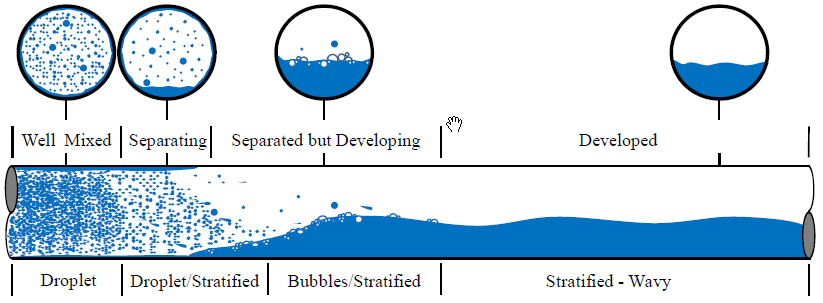Multiphase—Eulerian Approach
Multiphase flows, where several fluids flow in the domain of interest, play an important role in variety of industrial applications. In general, we associate phases with gases, liquids or solids and as such some simple examples of multiphase flows are: air bubbles rising in a glass of water, sand particles carried by wind, rain drops in air. The definition of phase can be generalized and applied to other fluid characteristics such as size, shape, density, and temperature.
Numerical simulations of such flows need to handle additional complexity in comparison to simulating single phase flow due to the presence of interface across which there is a jump in fluid-fluid properties and the exchange of mass, momentum and heat between the phases occurs as well. For modelling considerations, such flows can be classified based on increasing spatial scales of interface between the phases, into dispersed (bubbly flow, droplet flow), mixed / intermittent (slug flow, churn flow) and separated / stratified (film flow, annular flow, horizontal stratified flow).
| Type | Flow Regime | Geometry | Characteristics | Examples |
|---|---|---|---|---|
| Stratified flows | Film Flow |  |
|
Film condensation
Film boiling |
| Annular Flow |  |
|
|
|
| Jet Flow |  |
Gas pocket in liquid |
|
|
| Free surface | Tank filled with liquid and gas above |
|
||
| Mixed or transitional flows | Slug flow |  |
Gas pocket in liquid | Sodium boiling in forced convection |
| Bubbly annular flow |  |
Gas bubbles in liquid film with gas core | Evaporators with wall nucleation | |
| Droplet annular flow |  |
Gas core with droplets and liquid film | Steam generator | |
| Bubbly droplet annular flow |  |
Gas core with droplet and liquid film with gas bubbles | Boiling nuclear reactor channel | |
| Dispersed flows | Bubbly flow |  |
Gas bubbles in liqud | Chemical reactors |
| Droplet flow |  |
Liquid droplets in gas | Spray cooling | |
| Particulate flow |  |
Solid particles in gas or liquid | Transportation of powder |

The volume tracking / interface capturing methods such as VOF [523] or level-set methods [551] are well suited for simulation of stratified multiphase flows which are characterized by large scale interface. It must be noted that the size of computational cell is critical in classifying the interface as large scale or a small scale. Since the volume tracking / interface capturing methods rely on resolving the interface completely, they are prohibitively expensive for simulating multi-scale flows where modelling of dispersed regime accurately is equally important.
The two fluid model [453] [479], referred to as the Eulerian Multiphase (EMP) model in Simcenter STAR-CCM+, on the other hand, is successfully used for modelling dispersed flows as well as multi-scale flow situations where modeling of dispersed flow along with separated flow accurately is equally important.